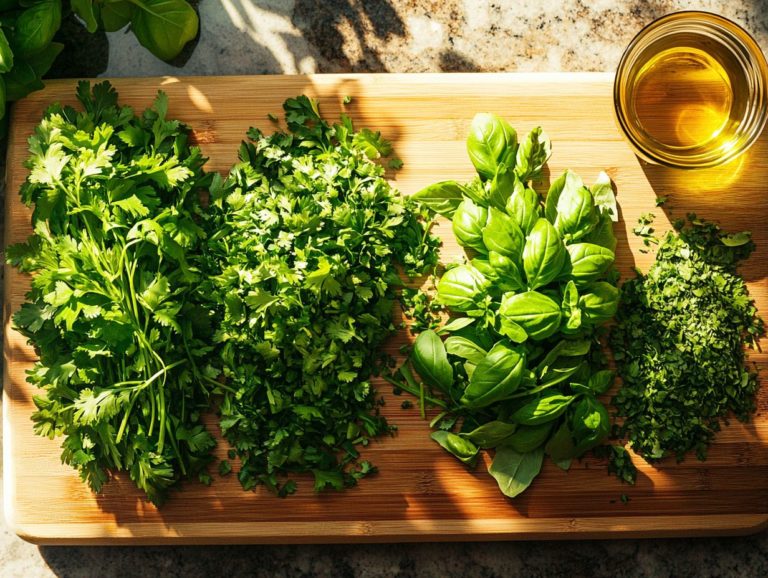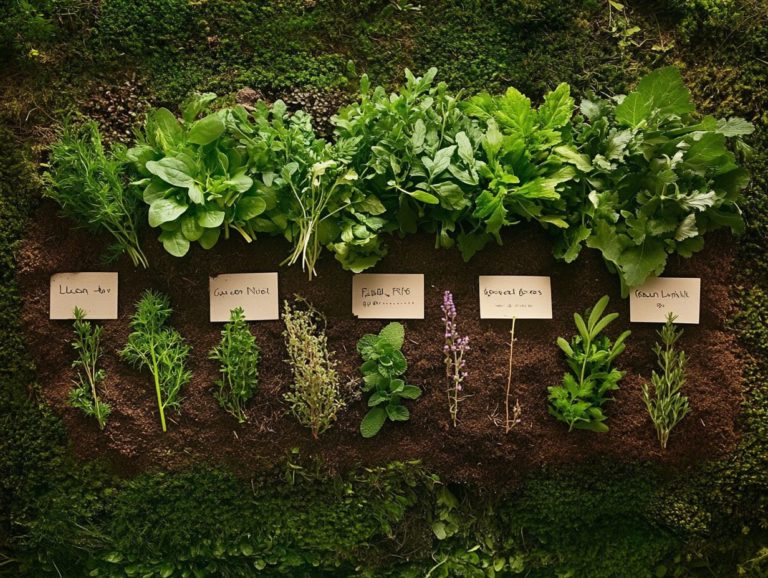What are the Most Common Edible Berries?
Edible berries are not merely a treat for your taste buds. They are also brimming with nutrients that can elevate your health.
From the sweetness of strawberries to the tang of blueberries, each variety presents its own distinct flavors and benefits.
Get ready to explore the most popular types, uncovering their unique characteristics and health benefits.
Discover innovative ways to weave these vibrant fruits into your meals. Keep essential safety tips at the forefront of your mind.
Join us on this exciting berry-filled journey to boost your health!
Contents
Key Takeaways:
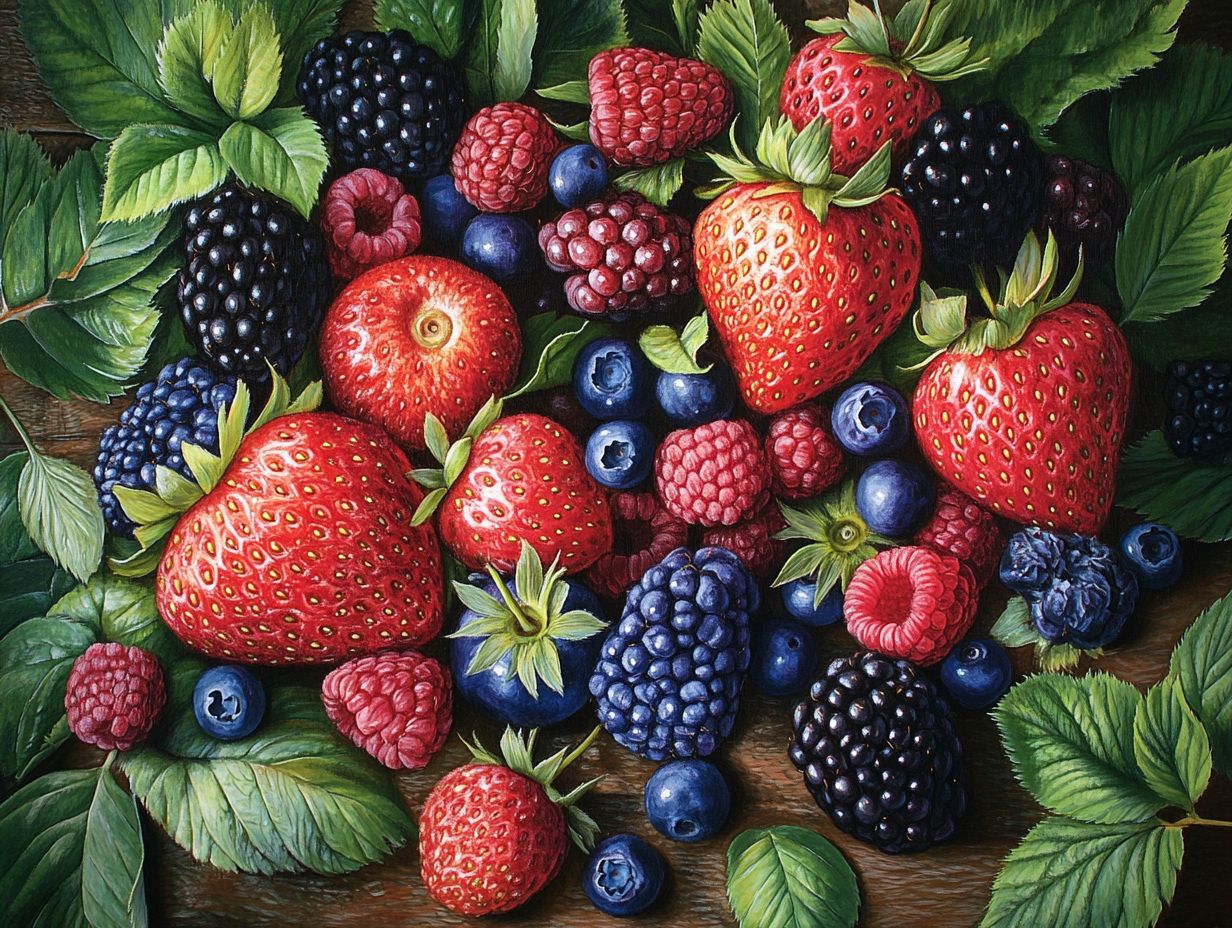
- Edible berries are a group of fruits that provide numerous health benefits.
- Common edible berries include strawberries, blueberries, raspberries, and blackberries.
- Adding berries to your meals is fun and easy, but be cautious of allergies.
What are Edible Berries?
Edible berries are small, juicy gems. They tantalize your taste buds and brim with nutrients, making them a beloved choice for health enthusiasts and foragers alike.
Scattered throughout the British Isles, you’ll encounter a delightful variety of species, including elderberries, rowan, blackberries, and rosehips.
These vibrant fruits are celebrated not just for their flavors but also for their impressive profiles of vitamins, antioxidants, and fiber. These nutrients play a significant role in maintaining a balanced diet.
Foraging means gathering wild food from nature and has emerged as a treasured practice, connecting you to nature and the age-old dietary traditions passed down through generations.
It s essential to master the art of distinguishing between various types of berries for safety. Some may closely resemble their edible cousins yet are dangerously toxic.
Take yew berries, for example deceptively appealing but harmful if consumed. By familiarizing yourself with common varieties and sharpening your identification skills, you can enhance your foraging experience while ensuring your health and safety remain intact.
Types of Edible Berries
You will discover an astonishing variety of edible berries thriving in the wild. Each one showcases its own unique flavors, colors, and health benefits.
Imagine the tartness of blackberries contrasted with the sweetness of wild cherries. These fruits present a delightful spectrum of taste experiences.
Lesser-known berries like guelder rose and bilberries offer cooking options and impressive nutritional value, making them worthy of your exploration as a keen forager or health-conscious individual.
Common Varieties and Characteristics
Among the most enticing varieties of edible berries, elderberries and hawthorn truly shine. They have distinctive flavors and remarkable health benefits.
Elderberries are packed with antioxidants, making them the go-to choice for syrups and jams. On the other hand, hawthorn berries are celebrated for their cardiovascular perks.
Don t overlook other noteworthy contenders like sea buckthorn, revered for its impressive vitamin C content. Damson berries are often used in crafting sloe gin, adding a unique twist to this classic drink.
These berries weave their way into various culinary delights, whether in sauces, desserts, or savory dishes designed to elevate both taste and nutrition.
Elderberries present a sweet yet slightly tart flavor. This makes them perfect for infusions and sweet treats.
Meanwhile, hawthorn lends an earthy, slightly tangy profile that s ideal for chutneys.
Sea buckthorn s tartness, paired with its vibrant orange hue, enhances smoothies and dressings while delivering a powerful immune boost.
In contrast, the juicy, succulent flesh of the damson beautifully complements sweet and spicy profiles.
Identifying these berries is an exciting adventure in foraging. You ll look for specific colorations, sizes, and growth patterns that make each discovery all the more rewarding.
Nutritional Benefits of Edible Berries
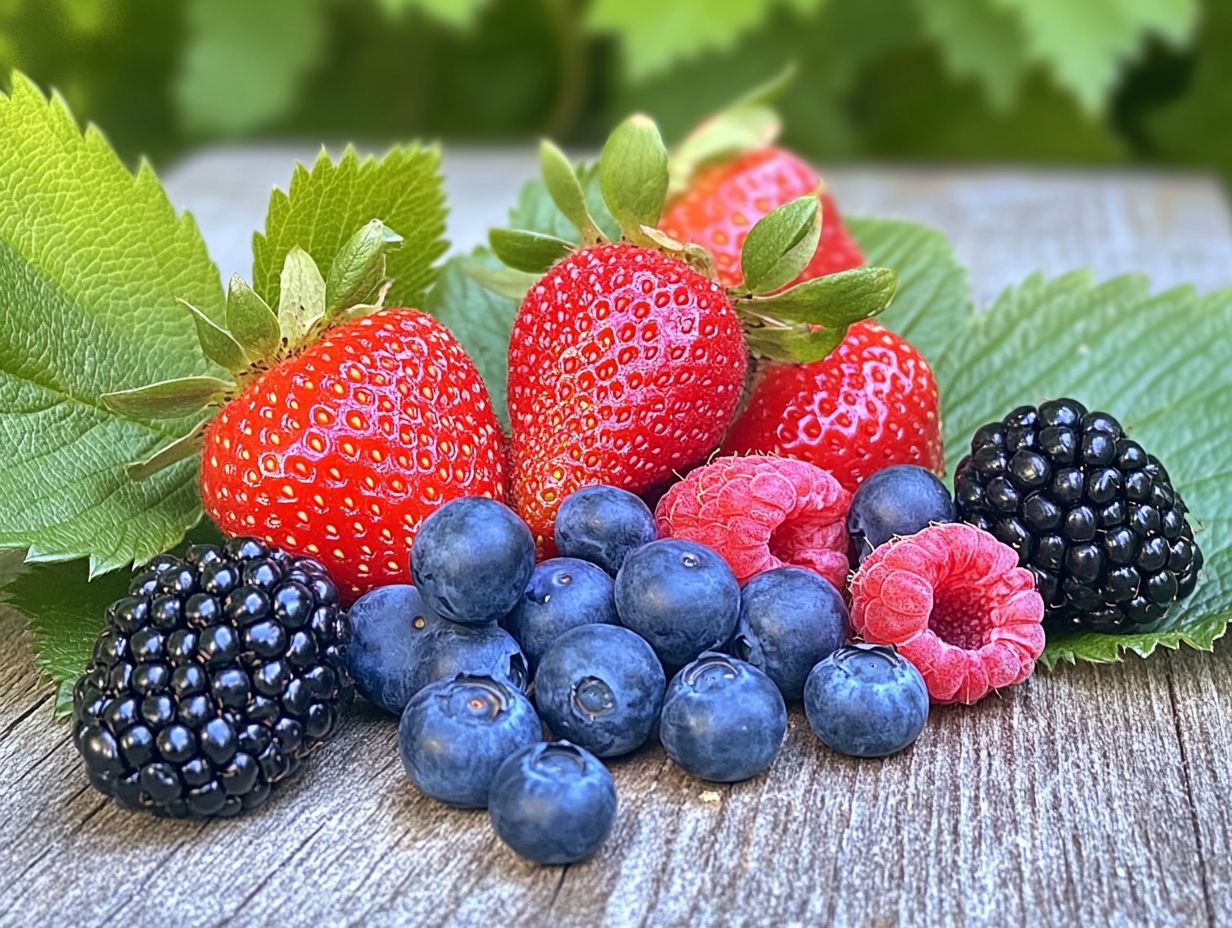
Edible berries are not merely delightful treats; they are very healthy foods brimming with an array of health benefits. This makes them essential to a balanced diet. Rich in antioxidants, vitamins, and minerals, these fruits help combat oxidative stress, which can damage cells in your body, and inflammation.
Regularly eating berries improves heart function, enhances cognitive abilities, and even supports effective weight management.
Key Nutrients and Health Benefits
The key nutrients found in edible berries offer a remarkable blend of antioxidants, essential vitamins, and fiber. All play a crucial role in their health benefits. For instance, vitamins C and K are abundant in blackberries and elderberries. These vitamins support immune function and promote healthy bone metabolism.
The high fiber content aids digestion and helps maintain a healthy weight. This makes these fruits an ideal addition to any diet.
Berries such as blueberries and strawberries are particularly rich in phytochemicals, especially flavonoids. These have been linked to reduced risks of heart disease and enhanced brain health. Research shows that the antioxidants in these fruits combat oxidative stress and inflammation two culprits often tied to chronic conditions like diabetes and cancer.
Don’t miss out! Adding different berries to your meals can boost your nutrition dramatically and bring vibrant flavors to your table. Regularly indulging in these nutrient-dense fruits can lead to lasting health benefits, effortlessly guiding you toward a more vibrant lifestyle.
How to Incorporate Edible Berries into Your Diet
Incorporating edible berries into your diet can be delightful and advantageous. These vibrant fruits offer a wealth of versatility, from fresh bites to innovative culinary creations, including unique dishes made with damson and sloes.
Take wild berries, for example. Elderberries and bilberries can be expertly transformed into jams, invigorating smoothies, or even infused in beverages for an exquisite flavor enhancement. This creates an exciting experience of foraging.
Whether you re foraging for these treasures or selecting them from a market, the possibilities to savor their rich flavors and health benefits in your daily meals are truly boundless.
Recipes and Serving Ideas
Creating delicious recipes with edible berries is a fun way to savor their flavors while reaping their health benefits. You have many options, from refreshing smoothies to luscious jams and decadent desserts.
Picture a vibrant berry salad, combining strawberries, blueberries, and elderberries for a nutrient-packed snack. Or imagine whipping up homemade jams that capture the essence of the season for future enjoyment.
Smoothies featuring a medley of berries can serve as a quick and nutritious breakfast or snack, ensuring you never miss out on these incredible superfruits.
Incorporating berries into yogurt parfaits not only adds a splash of color but also boosts the nutritional profile with their antioxidant goodness. You might also think about baking berry-studded muffins or scones, perfect for brunch gatherings or a cozy afternoon treat.
By experimenting with various types, like raspberries or blackberries, and tossing in fragrant herbs like mint or basil, you can elevate simple dishes into gourmet masterpieces.
This journey into berry-inspired cooking is an exciting way for you to enjoy their natural sweetness and diverse flavors while fostering a healthier lifestyle. Try these berry recipes today to boost your health and delight your taste buds!
Berry Safety Tips
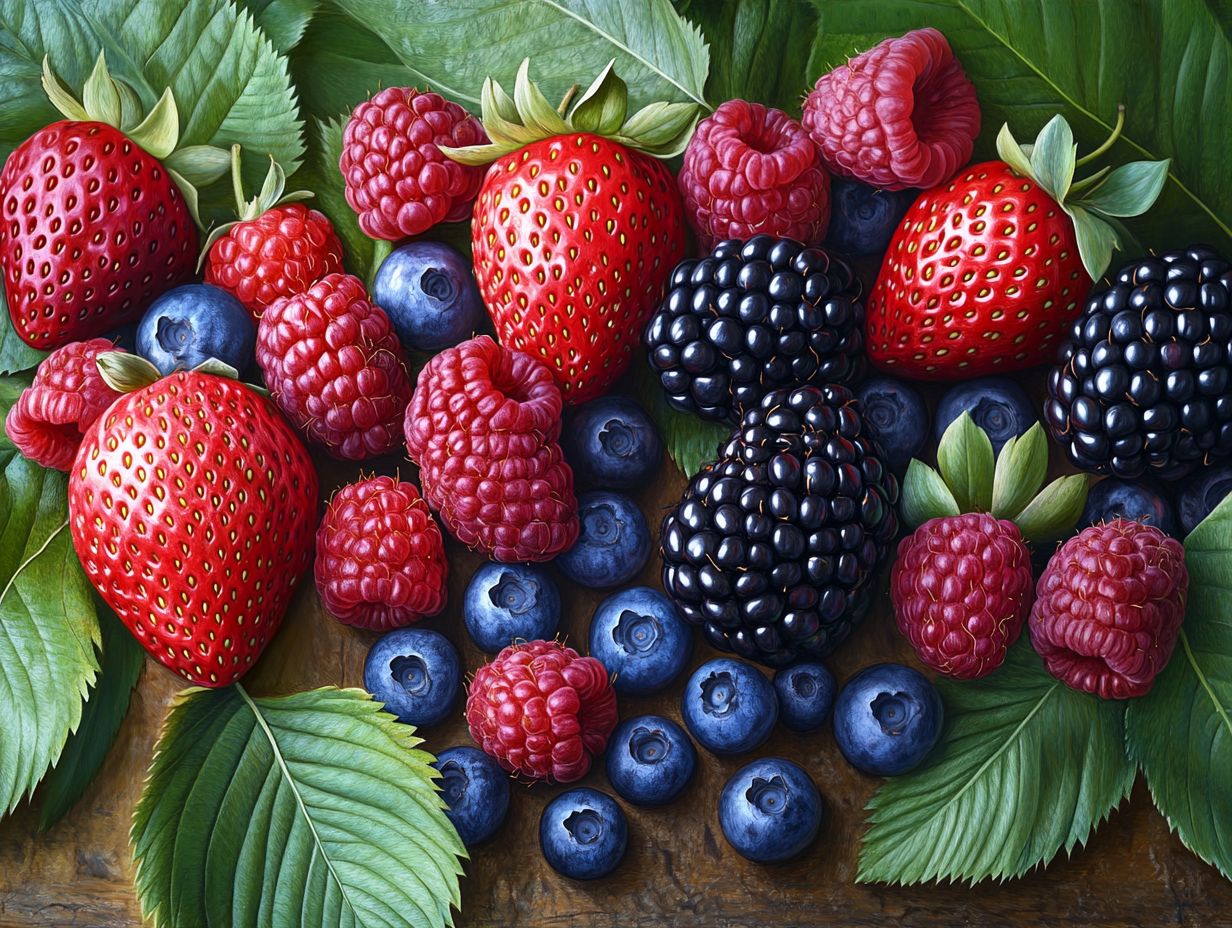
While edible berries are packed with health benefits, it s crucial to be mindful of potential risks and take necessary precautions for safe consumption. Some berries can be toxic or provoke allergic reactions.
Take, for example, the yew and guelder rose; these produce berries that can be harmful if ingested. This highlights the importance of accurate fruit and plant identification.
If you have specific allergies, proceed with caution when trying new berry varieties, including whitebeam berries, as certain species may elicit adverse reactions.
Allergies and Safety Concerns
Allergies to edible berries can vary significantly from person to person. Some may experience only mild reactions, while others may encounter severe consequences. This highlights the importance of exercising caution.
As a forager, always be aware of your personal allergies and the potential for mixing different types of berries while handling them.
Certain individuals may react negatively to specific berry varieties, like raspberries or blackberries, triggering symptoms that can range from hives to gastrointestinal distress. It s vital for anyone venturing into the wild to equip themselves with knowledge about their environment, distinguishing between safe and toxic plants. For example, elderberries can be harmful when unripe.
To ensure your safety while foraging, consider these foundational tips:
- Carry a reliable foraging guide.
- Wear gloves when handling unfamiliar plants.
- Start with small quantities to assess any allergic reactions.
Follow these tips to dive into the thrilling adventure of wild berry harvesting while keeping your health safe! Enjoy the experience while prioritizing your well-being and gaining a deeper understanding of the delicate balance within ecosystems.
Frequently Asked Questions
What are the Most Common Edible Berries?
The most common edible berries are strawberries, blueberries, raspberries, blackberries, cranberries, and cherries.
Are all berries edible?

No, not all berries are safe to eat. It is important to properly identify the berry and ensure it is not poisonous before consuming it.
What are the health benefits of eating berries?
Berries are rich in antioxidants, vitamins, fiber, and other important nutrients. They have been linked to improved heart health, lowered risk of chronic diseases, and better digestion.
Do all berries have the same nutritional value?
No, different berries have different nutritional values. For example, blueberries are known for their high antioxidant content, while strawberries are a good source of vitamin C.
Can wild berries be eaten?
Yes, there are many varieties of wild berries that are safe to eat and can be found in nature. However, it is important to properly identify them before consuming.
Are there any edible berries that are not sweet?
Yes, some edible berries have a tart or sour taste. Examples include cranberries and blackberries. These berries can also be used in cooking to add flavor to dishes.
Don’t risk it! Always double-check the berries you pick! Start foraging today, but do it with safety in mind!


